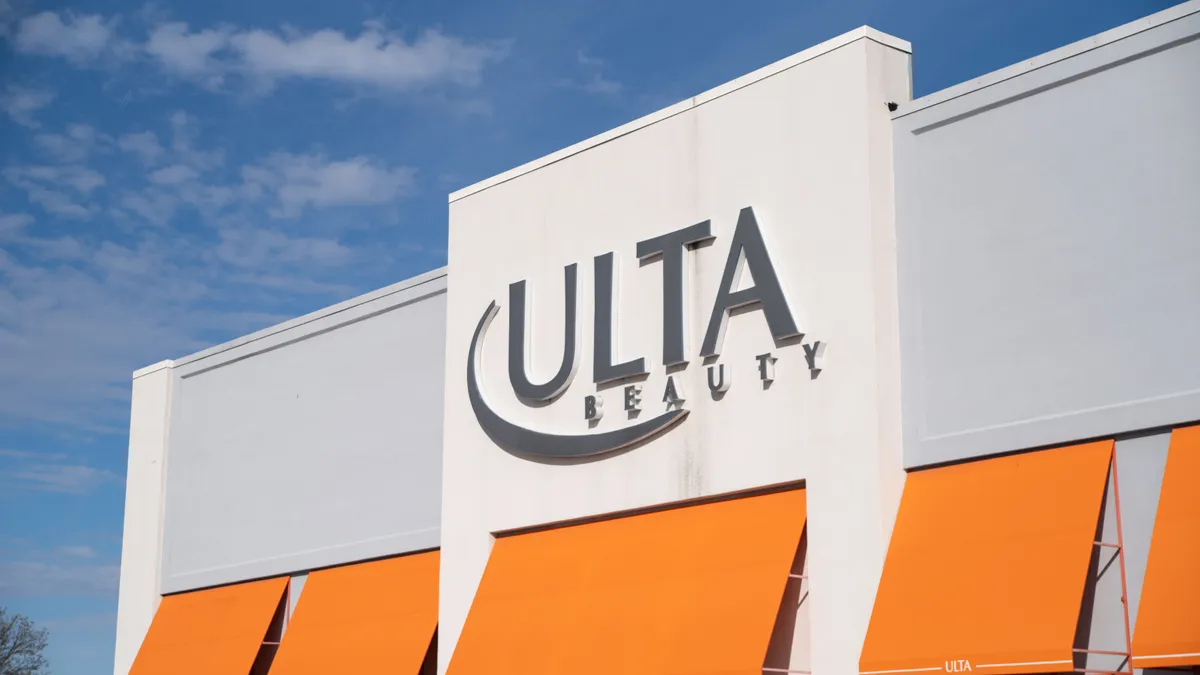Dive Brief:
-
Shortly after reporting a blockbuster partnership with Target, Ulta reported a somewhat muted Q3, beating FactSet expectations for adjusted earnings, but falling short on net sales. However, pandemic-related services like e-commerce and BOPIS both grew, with online comps increasing 90% and BOPIS totaling 16% of e-commerce sales, according to company executives.
-
Net sales in the quarter fell 7.8% to $1.6 billion, while comps decreased 8.9% and net income fell 42% to $74.8 million, according to a company press release. Gross profit also decreased, by 12.5%, to $545.5 million, or 35.1% of net sales, while operating income fell to $101 million, or 6.5% of net sales.
-
While the beauty retailer shared little color on its deal to open shop-in-shops at Target, executives said on a conference call that it will not impact the retailer's own store opening plans, which include 30 new stores and relocations of five in 2020, and "at least" 30 new stores planned for 2021, according to a Seeking Alpha transcript. (The retailer had originally planned for 75 new stores in 2020.)
Dive Insight:
While Ulta continues to be a winner in the beauty space, the retailer still faces headwinds from a pandemic that has made high-touch categories like beauty more difficult to operate in.
Makeup in particular is still "challenged," CEO Mary Dillon said on a call with analysts, citing shifting consumer behavior thanks to the pandemic and delays in innovation. Fragrance and bath was the strongest category, Dillon said, though skincare also grew as customers focused more on self-care.
"Leaning into these trends and the opportunity to increase our market share in this category, we continue to expand our assortment, while also increasing space and marketing support for this key growth category," Dillon said of skincare.
The beauty retailer's experiential services business also continues to suffer from COVID-related restrictions, with sales down more than 30% in the quarter. The retailer hasn't been able to restart skin and makeup services because of the pandemic, but salon and brow services were available in nearly all stores, Dillon said.
A key focus for the retailer is improving the in-store discovery experience during the pandemic, since testers are still unavailable for shoppers in stores. As part of that effort, the retailer has introduced QR codes on certain shelves that direct customers to the virtual try-on Glamlab experience, to add convenience to that tool.
Not being able to use stores in their full capacity has hurt the beauty retailer. Its Ultamate rewards member growth, usually a highlight, was flat from last quarter, and down 6% year over year, primarily because of store closures, executives said on the call.
"That hurts our new member conversion and it also impacts retention, because as you know, while our e-commerce business is growing and we have a significant increase in penetration of our member base at our e-commerce, it's still a majority store-based user loyalty program," President Dave Kimbell said, "and some of those guests, particularly the least engaged, the non-elite guests, we have seen a bit of a hit on retention with those least tenured guests."
As a vaccine edges closer, the retailer's troubles may ease, and next year the retailer will also have Target's strong pandemic performance to drive foot traffic to its shop-in-shops. Dillon noted the Target partnership was an expansion of its omnichannel capabilities and would give customers more convenient ways to access the company.
"[W]e know guests are changing how they shop for beauty, but their engagement with the category remains strong," Dillon said.















